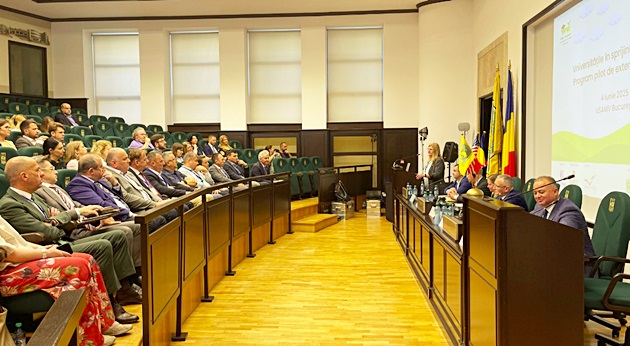794

Romania’s Agronomic Universities Open Their Doors to Farmers through U.S.-Inspired Agricultural Extension Program
- Three Romanian agronomic universities will directly engage with farmers, bringing academic knowledge and research results closer to rural communities.
- The first university extension centers will be established in the counties of Cluj, Timiș, and Brașov (Făgăraș region).
The Civitas Foundation for Civil Society, in partnership with the Romanian-American Foundation and the University of Georgia (USA), has launched a pilot program for agricultural extension services in Romania. This initiative aims to bridge the gap between farmers and agronomic universities, adopting a U.S.-style model for knowledge transfer.
Although agricultural extension systems are not well-known in Romania, they play a vital role in modernizing agriculture by offering information, training, and consultancy to farmers. These services help improve production, encourage the adoption of new technologies, and support the growth of rural businesses. In many countries, universities are central to delivering these services due to their academic expertise and ties to innovation.
According to Eurostat (2020), less than 1% of Romanian farmers have received specialized training, compared to 38% in France and 26% in Poland.
Universities Involved
The pilot program, funded by the Romanian-American Foundation, will be implemented by:
- The University of Agronomic Sciences and Veterinary Medicine of Bucharest (USAMV Bucharest)
- The University of Agricultural Sciences and Veterinary Medicine of Cluj-Napoca (USAMV Cluj-Napoca)
- The University of Life Sciences “King Mihai I” of Timișoara
The extension services will initially support farmers in Cluj, Timiș, and Brașov counties, with a focus on the Făgăraș region.
The model mirrors that of the United States, where universities work directly with farmers to boost productivity, sustainability, and resilience, while also addressing environmental, nutritional, and rural development challenges.
U.S. Collaboration and Training
Romanian universities are working closely with faculty members from the University of Georgia, with 10 Romanian professors having already completed six-month study visits in the U.S. to gain hands-on experience with extension services.
“U.S. universities provide agricultural consulting services—known as extension services—not only to farmers but also to businesses and community members. Their mission is to professionalize rural entrepreneurs by connecting academic expertise to field-level practice,” explained American experts.
The launch event was hosted by USAMV Bucharest and featured speeches by Roxana Vitan (President, Romanian-American Foundation), Sorin Cîmpeanu (Rector, USAMV Bucharest), Alys L. Spensley (Public Affairs Counselor, U.S. Embassy), and Todd Applegate (University of Georgia).
“We’ve prepared the third cohort of Romanian fellows. The University Politehnica of Bucharest has also joined, which is key as precision agriculture and ag-tech become increasingly vital—especially in adapting to climate change,” said Roxana Vitan. “We’re also working with the Bucharest Academy of Economic Studies to address farmers’ needs for economic advice and business growth.”
“Our fellows worked closely with faculty in Georgia who specialize in extension, engaging in outreach, teaching, and research. These experiences provide deep insight into agricultural development models in different U.S. states like North Carolina and Virginia,” added Todd Applegate, Associate Dean for Global Programs, College of Agricultural and Environmental Sciences, University of Georgia.
Policy and Academic Endorsement
During a session dedicated to policymaker perspectives, officials from the Ministries of Agriculture and Education, rectors of leading agronomic universities, and representatives from the Romanian Academy and the Academy of Agricultural and Forestry Sciences discussed the critical role of extension services and the need for closer collaboration between academia, public institutions, and the farming sector.
“The academic mission of education and research must be anchored in real-world connections—with the economy, with farmers, with contractual responsibility,” said Cornel Cătoi, Rector of USAMV Cluj-Napoca. “We cannot afford professors shaped solely by the classroom or laboratory. We need educators grounded in practice.”
Sorin Cîmpeanu, Rector of USAMV Bucharest, emphasized that universities lack sufficient funding for extension projects on their own. “The first step is building a model adapted to Romanian realities. Without strong partnerships between agronomic universities and agricultural businesses, development is impossible.”
Looking Ahead
The pilot program, coordinated by the Civitas Foundation, will become operational in the next academic year across the three participating universities.
“This program opens the door not just to students, but to all farmers—regardless of educational background,” said Marton Balogh, Executive Director of the Civitas Foundation. “Romanian professors have gained hands-on experience in the U.S., and our American partners conducted a study with 1,000 Romanian farmers to understand their needs.




